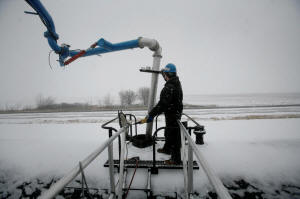Trump, eyeing Farm Country, starts working on ethanol industry's
year-old wishlist
 Send a link to a friend
Send a link to a friend
 [September 24, 2020]
By Stephanie Kelly and Jarrett Renshaw [September 24, 2020]
By Stephanie Kelly and Jarrett Renshaw
NEW YORK (Reuters) - President Donald
Trump, looking to shore up support in the U.S. Farm Belt during a tight
race for re-election, is taking steps to help producers of corn-based
ethanol using a list of policy goals that a group of Midwest senators
discussed with him a year ago, according to two sources familiar with
the matter.
On Sept. 12, 2019, Trump met with the senators, who were frustrated by
the administration's management of U.S. biofuels policy. They argued
that Trump's Environmental Protection Agency had been helping the oil
industry at the expense of farmers dependent on ethanol sales, and
presented him with a list of ways he could fix the problem, according to
five sources familiar with the matter.
Following that meeting, Trump announced progress had been made on a
biofuel reform package, but gave no details. "I think we had a great
meeting on ethanol for the farmers," Trump told reporters at the White
House. "Let's see what happens."

A year later, Trump and his administration have begun chipping away at
the industry's wishlist, using the meeting as a blueprint to court his
crucial Farm Belt constituency in what is expected to be a tight contest
with Democratic rival Joe Biden, according to the sources.
The 2019 meeting, which included senators Chuck Grassley and Joni Ernst
from Iowa and senators John Thune and Mike Rounds from South Dakota,
produced a list of 11 policy items, according to one of the sources and
a memo from the meeting reviewed by Reuters.
They included ratcheting down the EPA's biofuel waiver program exempting
refineries from adding ethanol to their gasoline; setting higher biofuel
blending volume requirements for 2020; expanding the market for higher
ethanol blends of gasoline called E15; exploring a national biofuels
infrastructure program; and addressing ethanol and biodiesel trade
issues, particularly with Brazil, according to the memo - the details of
which have not previously been published.
In recent weeks, Trump has moved on some of these goals, using them as a
battle plan for his election strategy in the Midwest, according to two
sources.
The White House and the U.S. Environmental Protection Agency, which
regulates compliance with biofuel requirements, did not comment for this
story.
First, Trump's EPA this month denied scores of retroactive small
refinery waivers that would have allowed more than a dozen refining
facilities to continue seeking exemptions from RFS obligations each
year. The biofuels industry saw the move as a step toward winding down
the controversial waiver program, a key point of discussion during the
2019 meeting.
Trump also urged Brazil to continue its policy of not imposing tariffs
on imported ethanol, asking Brazilian President Jair Bolsonaro's
government to eliminate any levies. Brazil since announced it will
extend a tariff-free import program for biofuels until after the
election.
[to top of second column]
|

Load out technician Slade Whetro fills a railroad tank car with
ethanol fuel, converted from corn, at the Lincolnway Energy plant in
the town of Nevada, Iowa, December 6, 2007. REUTERS/Jason Reed
(UNITED STATES)/File Photo

Then on Sept. 12, exactly one year after the meeting with senators,
Trump tweeted he would allow states to permit fuel retailers to use
their current pumps to sell E15 gasoline instead of installing new
equipment, a move that could help lift ethanol sales quickly.
With the election looming, Trump had been under increasing pressure
from within his campaign to please agriculture interests, and
Midwest lawmakers and agricultural trade associations had been
reminding Trump of his slow action on the 2019 wishlist up to that
point.
"(In August) we turned up the message that it's been a year, nothing
has happened, and people are getting mad about it," said one of the
sources.
"The meeting was highly influential," another source familiar with
the matter said. "It was the administration getting a chance to hear
from states firsthand."
The administration's moves reflect the political importance of
ethanol. Laws surrounding the corn-based fuel carry a lot of weight
for biofuel producers and farmers, a constituency that helped carry
Trump to a narrow victory in the 2016 election.
Biden's campaign and Senate Democrats had noticed farmers'
frustration with Trump and had attacked him for not holding to his
commitments.
Even so, several items on the ethanol industry wishlist remain,
along with new uncertainties creating angst in the Farm Belt.
Biofuel interests want assurances, for example, that 2020 blending
requirements will be enforced despite the fact the coronavirus
pandemic has slashed fuel demand.

They also want the Trump administration to announce its proposed
biofuel blending volume mandates for 2021, and make final decisions
on all outstanding small refinery exemption applications under
consideration by the EPA.
(Reporting by Stephanie Kelly and Jarrett Renshaw; editing by
Richard Valdmanis and David Gregorio)
[© 2020 Thomson Reuters. All rights
reserved.] Copyright 2020 Reuters. All rights reserved. This material may not be published,
broadcast, rewritten or redistributed.
Thompson Reuters is solely responsible for this content. |